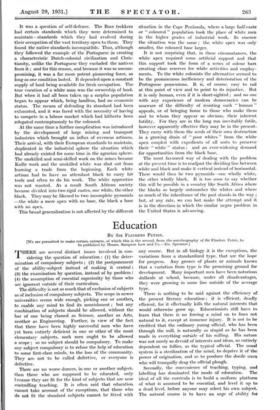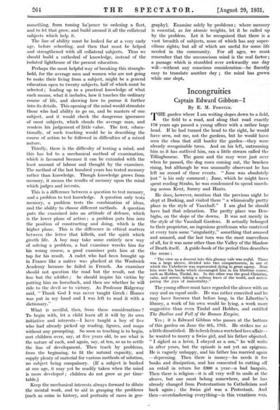Education
BY SIR FLINDERS PETRIE.
[We are permitted to make certain extracts, of which this is the second, from the autobiography of Sir Flinders Petrie, to be published by Messrs. Sampson Low and Co.—ED. Spectator.] THERE are several distinct issues involved in con- sidering the question of education : (1) the deter- mination of compulsory subjects ; (2) the postponement of the ability-subject instead of making it central ; (3) the examination by question, instead of by problem ; (4) the assumption of essential superiority by those who are ignorant outside of their curriculum.
The difficulty is not so much that of exclusion of subjects as of inclusion of compulsory subjects. The scope in newer universities seems wide enough, picking one or another, to enable any mind to find its nourishment ; but any combination of subjects should be allowed, without the bar of one being classed as Science, another as Arts, another as Engineering. Further, in view of the fact that there have been highly successful men who have yet been entirely deficient in one or other of the most elementary subjects, such men ought to be allowed a scope ; so no subject should be compulsory. To make any subject compulsory is to refuse the help of education to some first-class minds, to the loss of the community. They are not to be called defeetive, or everyone is defective.
There are no worse dunces, in one or another subjects than those who are supposed to be educated, only Eecause they are fit for the kind of subjects that are now controlling teaching. It is often said that education cannot take account of the exceptions, that those who do not fit the standard subjects cannot be fitted with any course. But in all biology it is the exceptions, the variations from a standardized type, that are the hope for progress. Any grower of plants or animals knows that a variation from type is the promising ground for development. Many important men have been notorious dullards at school, because, under all disadvantages, they were growing in some line outside of the average type.
There is nothing to be said against the efficiency of the present literary education ; it is efficient, deadly efficient, for it effectually kills the natural interests that would otherwise grow up. Educationists still have to learn that there is no forcing a mind on to lines not natural to it, except at immense injury. It is not to be credited that the ordinary young official, who has been through the mill, is naturally as stupid as he has been made in everything outside of his milling. His nature was not surely so devoid of interests and ideas, so entirely dependent on follies, as the typical official. The usual system is a sterilization of the mind, to deprive it of the power of origination, and so to produce the docile oxen who will tranquilly drag the official plough.
Secondly, the convenience of teaching, typing, and labelling has dominated the mode of education. The ideal of all the curricula is to build a uniform platform of what is assumed to be essential, and level it up to a dead level, before anyone may select his own subject. The natural course is to have an urge of ability for something, from tossing ha'pence to ordering a fleet, and to let that grow, and build around it all the collateral subjects which help it.
The line of ability must be looked for at a very early age, before schooling, and then that must be helped and strengthened with all collateral subjects. Thus we should build a cathedral of knowledge, instead of the isolated lighthouse of the present education.
Perhaps the most helpful way of breaking this strangle- hold, for the average men and women who are not going to make their living from a subject, might be a general education open to twenty subjects, half of which must be selected ; leading up to a practical knowledge of what each means, what it includes, how it touches the ordinary course of life, and showing how to pursue it further into its details. This opening of the mind would stimulate those who had ability to go on, and be masters of one subject, and it would check the dangerous ignorance of most subjects, which clouds the average man, and renders his judgement of little value. The test, educa- tionally, of such teaching would be in describing the course of action to be followed in difficulties of a mixed nature.
• Thirdly, there is the difficulty of testing a mind, and this has led to a mechanical method of examination, which is favoured because it can be extended with the least amount of labour and thought by the examiner. The method of the last hundred years has tested memory rather than knowledge. Though knowledge grows from memory, it means the results of memory upon the mind which judges and invents.
This is a difference between a question to test memory, and a problem to test knowledge. A question only tests memory, a problem tests the combination of ideas, and the ability to choose different methods. A question puts the examined into an attitude of defence, which is the lower plane of action ; a problem puts him into the position of constructing and doing, which is the higher plane. This is the difference in ethical matters between the letter that killeth, and the spirit which giveth life. A boy may take some entirely new way of solving a problem, a bad examiner wrecks him for his wrong course, a good examiner puts him at the top for his result. A cadet who had been brought up in France like a native was, plucked at the Woolwich Academy because he failed in French. An examiner should not question the road but the result, not the how but the whither ; he should inspire his victim by putting him on horseback, and then see whether he will ride to the devil or to victory. As Professor Ridgeway said, "Thank God I was never taught Greek : Homer was put in my hand and I was left to read it with a dictionary."
What is needful, then, from these considerations ? To begin with, let a child learn all it will by its own initiative and interests—I have taught a boy of five who had already picked up reading, figures, and maps without any prompting. So soon as teaching is to begin, sort children over, say, at five years old, to see what is the nature of each, and again, say, at ten, so as to settle the line of development. Then teach by problems, from the beginning, to fit the natural capacity, and supply plenty of material for various methods of solution, no subject being compulsory. (If a subject is burked at one age, it may yet be readily taken when the mind is more developed ; children do not grow as per time- table.) Keep the mechanical interests always forward to dilute the mental work, and to aid in grasping the problems (such as coins in history, and portraits of races in geo- graphy). Examine solely by problems ; where memory• is essential, as for atomic weights, let it be called up by the problem. Let it be recognized that there is a vast breadth of subjects, none of which has any super- cilious rights; but all -of which are useful for some life needed in the community. For all ages, we • must remember that the unconscious mind is the real factor ; a passage which is stumbled over awkwardly one day will—without any conscious consideration—be fluently easy to translate another day ; the mind has grown while one slept.



























 Previous page
Previous page